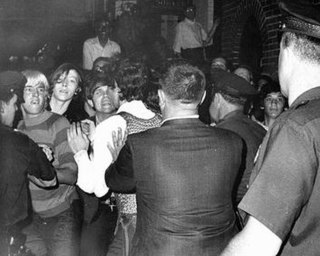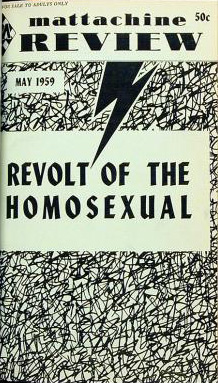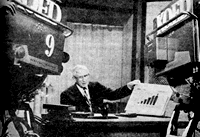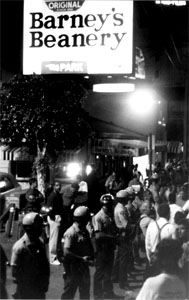See also
- Timeline of LGBT history – timeline of events from 12,000 BCE to present
- LGBT rights by country or territory – current legal status around the world
- LGBT social movements
| |||
|---|---|---|---|
| +... |
This is a list of notable events in the history of LGBT rights that took place in the 1960s.

Lesbian, gay, bisexual, and transgender (LGBT) movements are social movements that advocate for LGBT people in society. Although there is not a primary or an overarching central organization that represents all LGBT people and their interests, numerous LGBT rights organizations are active worldwide. The first organization to promote LGBT rights was the Scientific-Humanitarian Committee, founded in 1897 in Berlin.

The Stonewall riots, also known as the Stonewall uprising, Stonewall rebellion, or simply Stonewall, were a series of spontaneous protests by members of the gay community in response to a police raid that began in the early morning hours of June 28, 1969, at the Stonewall Inn in the Greenwich Village neighborhood of Lower Manhattan in New York City. Patrons of the Stonewall, other Village lesbian and gay bars, and neighborhood street people fought back when the police became violent. The riots are widely considered the watershed event that transformed the gay liberation movement and the twentieth-century fight for LGBT rights in the United States.

The Mattachine Society, founded in 1950, was an early national gay rights organization in the United States, preceded by several covert and open organizations, such as Chicago's Society for Human Rights. Communist and labor activist Harry Hay formed the group with a collection of male friends in Los Angeles to protect and improve the rights of gay men. Branches formed in other cities, and by 1961 the Society had splintered into regional groups.

The homophile movement is a collective term for the main organisations and publications supporting and representing sexual minorities in the 1950s to 1960s around the world. The name comes from the term homophile, which was commonly used by these organisations. At least some of these organisations are considered to have been more cautious than both earlier and later LGBT organisations; in the U.S., the nationwide coalition of homophile groups disbanded after older members clashed with younger members who had become more radical after the Stonewall riots of 1969.

Gay Liberation Front (GLF) was the name of several gay liberation groups, the first of which was formed in New York City in 1969, immediately after the Stonewall riots. Similar organizations also formed in the UK, Australia and Canada. The GLF provided a voice for the newly-out and newly-radicalized gay community, and a meeting place for a number of activists who would go on to form other groups, such as the Gay Activists Alliance and Street Transvestite Action Revolutionaries (STAR) in the US. In the UK and Canada, activists also developed a platform for gay liberation and demonstrated for gay rights. Activists from both the US and UK groups would later go on to found or be active in groups including ACT UP, the Lesbian Avengers, Queer Nation, Sisters of Perpetual Indulgence, and Stonewall.

The gay liberation movement was a social and political movement of the late 1960s through the mid-1980s in the Western world, that urged lesbians and gay men to engage in radical direct action, and to counter societal shame with gay pride. In the feminist spirit of the personal being political, the most basic form of activism was an emphasis on coming out to family, friends, and colleagues, and living life as an openly lesbian or gay person.
William Dorr Lambert Legg, known as W. Dorr Legg, was an American landscape architect and one of the founders of the United States gay rights movement, then called the homophile movement.
This is a list of notable events in the history of LGBT rights that took place worldwide in the 1950s.
LGBT movements in the United States comprise an interwoven history of lesbian, gay, bisexual, transgender and allied movements in the United States of America, beginning in the early 20th century and influential in achieving social progress for lesbian, gay, bisexual, transgender and transsexual people.
This is a list of notable events in the history of LGBT rights that took place in the 1970s.

LGBT pride is the promotion of the self-affirmation, dignity, equality, and increased visibility of lesbian, gay, bisexual, and transgender (LGBT) people as a social group. Pride, as opposed to shame and social stigma, is the predominant outlook that bolsters most LGBT rights movements. Pride has lent its name to LGBT-themed organizations, institutes, foundations, book titles, periodicals, a cable TV channel, and the Pride Library.

Craig L. Rodwell was an American gay rights activist known for founding the Oscar Wilde Memorial Bookshop on November 24, 1967 - the first bookstore devoted to gay and lesbian authors - and as the prime mover for the creation of the New York City gay pride demonstration. Rodwell, who was already an activist when he participated in the 1969 Stonewall uprising, is considered by some to be the leading gay rights activist in the early, pre-Stonewall, homophile movement of the 1960s.
The North American Conference of Homophile Organizations was an umbrella organization for a number of homophile organizations. Founded in 1966, the goal of NACHO was to expand coordination among homophile organizations throughout the Americas. Homophile activists were motivated in part by an increase in mainstream media attention to gay issues. Some feared that without a centralized organization, the movement would be hijacked, in the words of founding member Foster Gunnison Jr., by "fringe elements, beatniks, and other professional non-conformists".
The Annual Reminders were a series of early pickets organized by gay organizations, held yearly from 1965 through 1969. The Reminder took place each July 4 at Independence Hall in Philadelphia and were among the earliest LGBT demonstrations in the United States. The events were designed to inform and remind the American people that gay people did not enjoy basic civil rights protections.

The Rejected is a made-for-television documentary film about homosexuality, produced for KQED in San Francisco by John W. Reavis. The Rejected was the first documentary program on homosexuality broadcast on American television. It was first shown on KQED on September 11, 1961, and was later syndicated to National Educational Television (NET) stations across the United States. The Rejected received positive critical reviews.

A zap is a form of political direct action that came into use in the 1970s in the United States. Popularized by the early gay liberation group Gay Activists Alliance, a zap was a raucous public demonstration designed to embarrass a public figure or celebrity while calling the attention of both gays and straights to issues of gay rights.
The Council on Religion and the Homosexual (CRH) was a San Francisco, California, United States-based organization founded in 1964 for the purpose of joining homosexual activists and religious leaders.
East Coast Homophile Organizations (ECHO) was established in January 1962 in Philadelphia, to facilitate cooperation between homophile organizations and outside administrations. Its formative membership included the Mattachine Society chapters in New York and Washington D.C., the Daughters of Bilitis chapter in New York, and the Janus Society in Philadelphia, which met monthly. Philadelphia was chosen to be the host city, due to its central location among all involved parties.